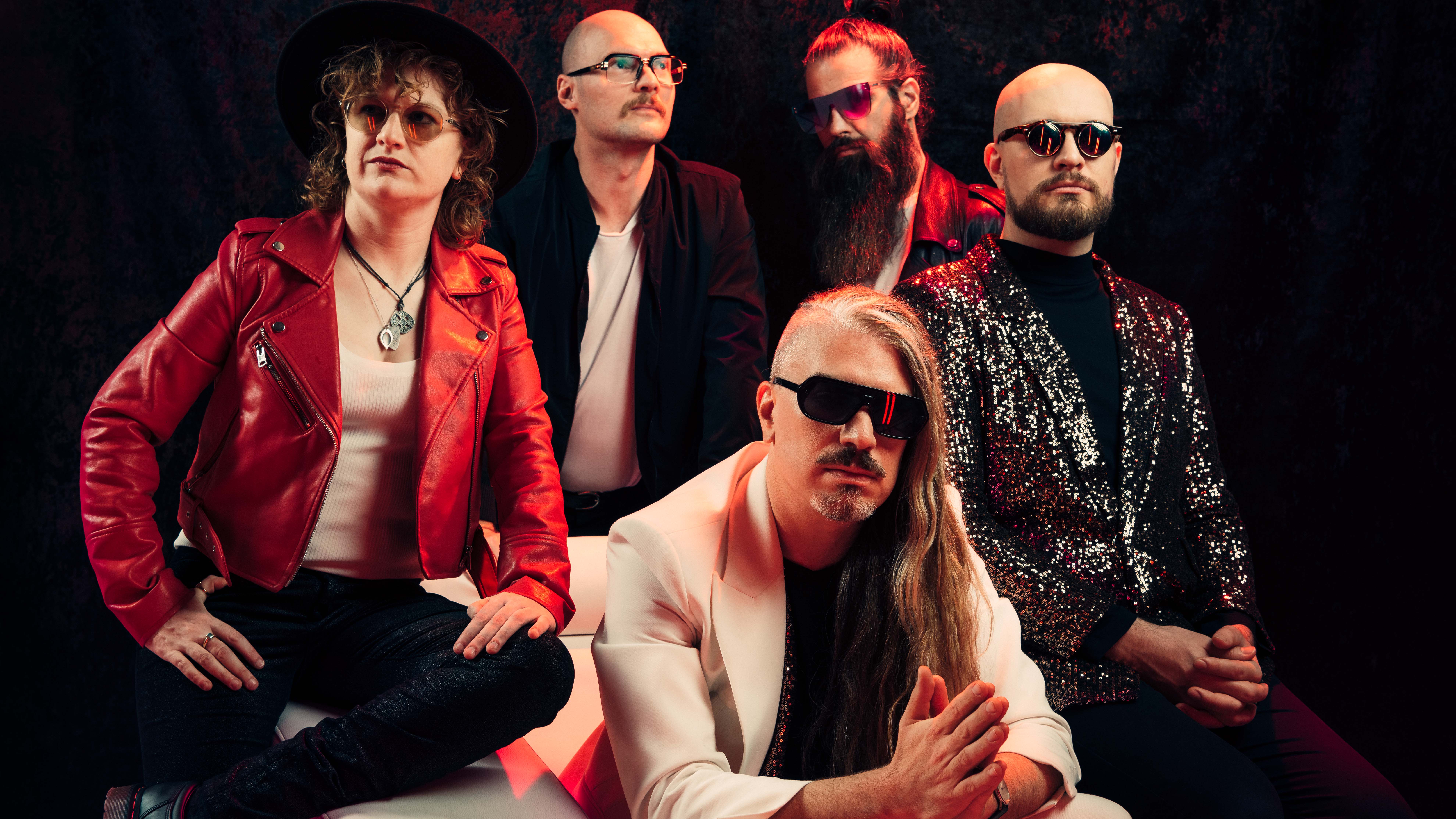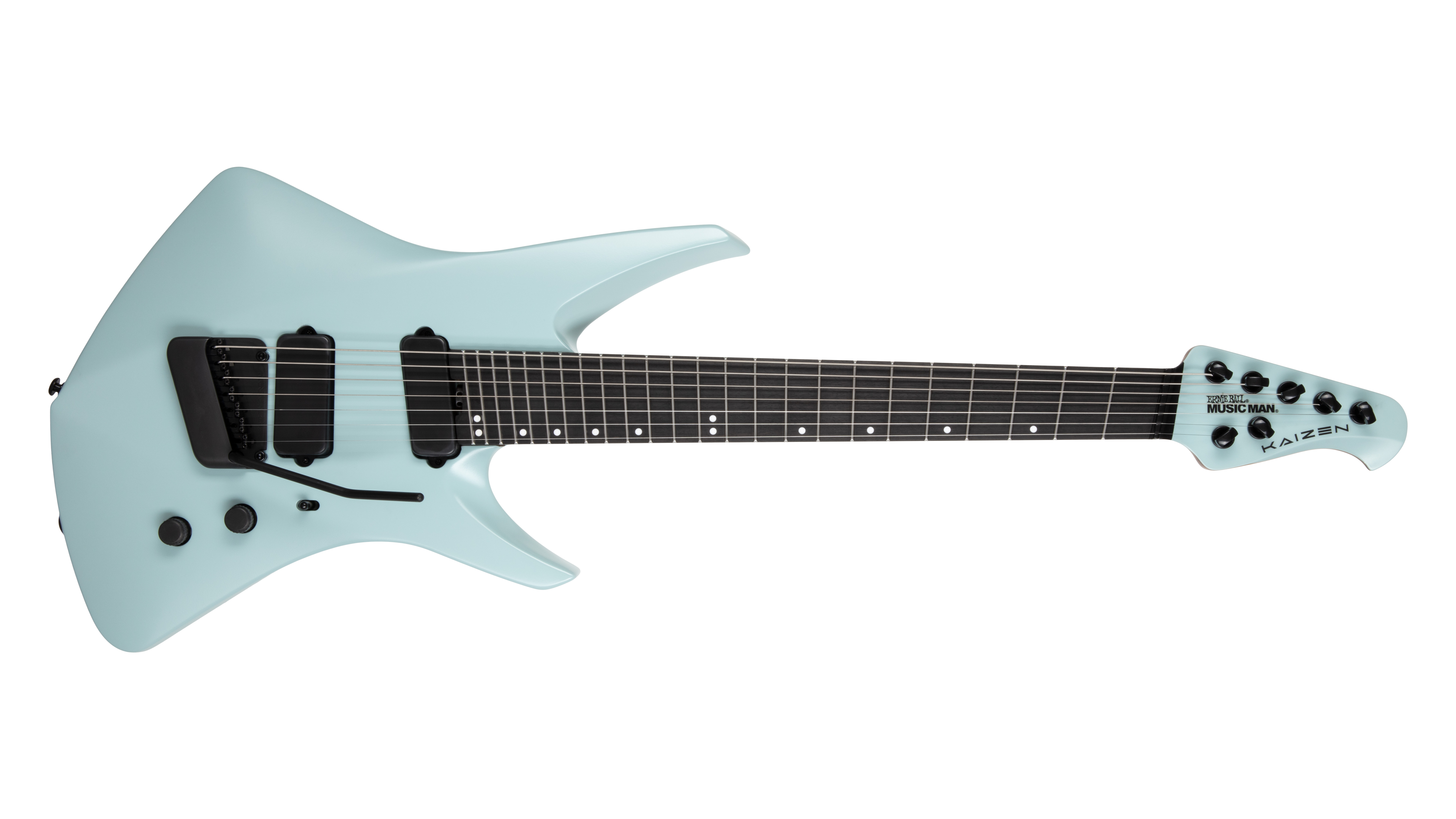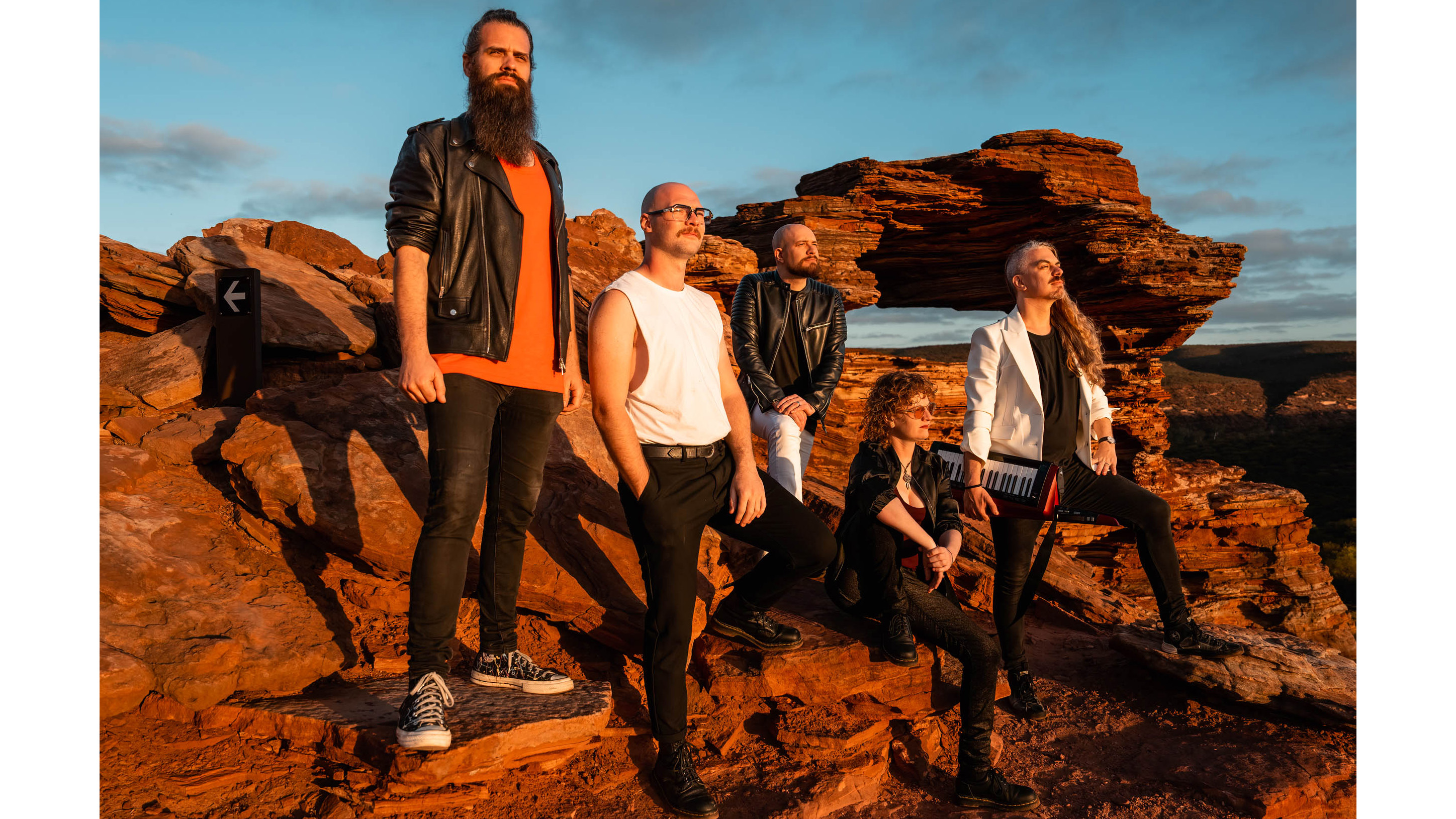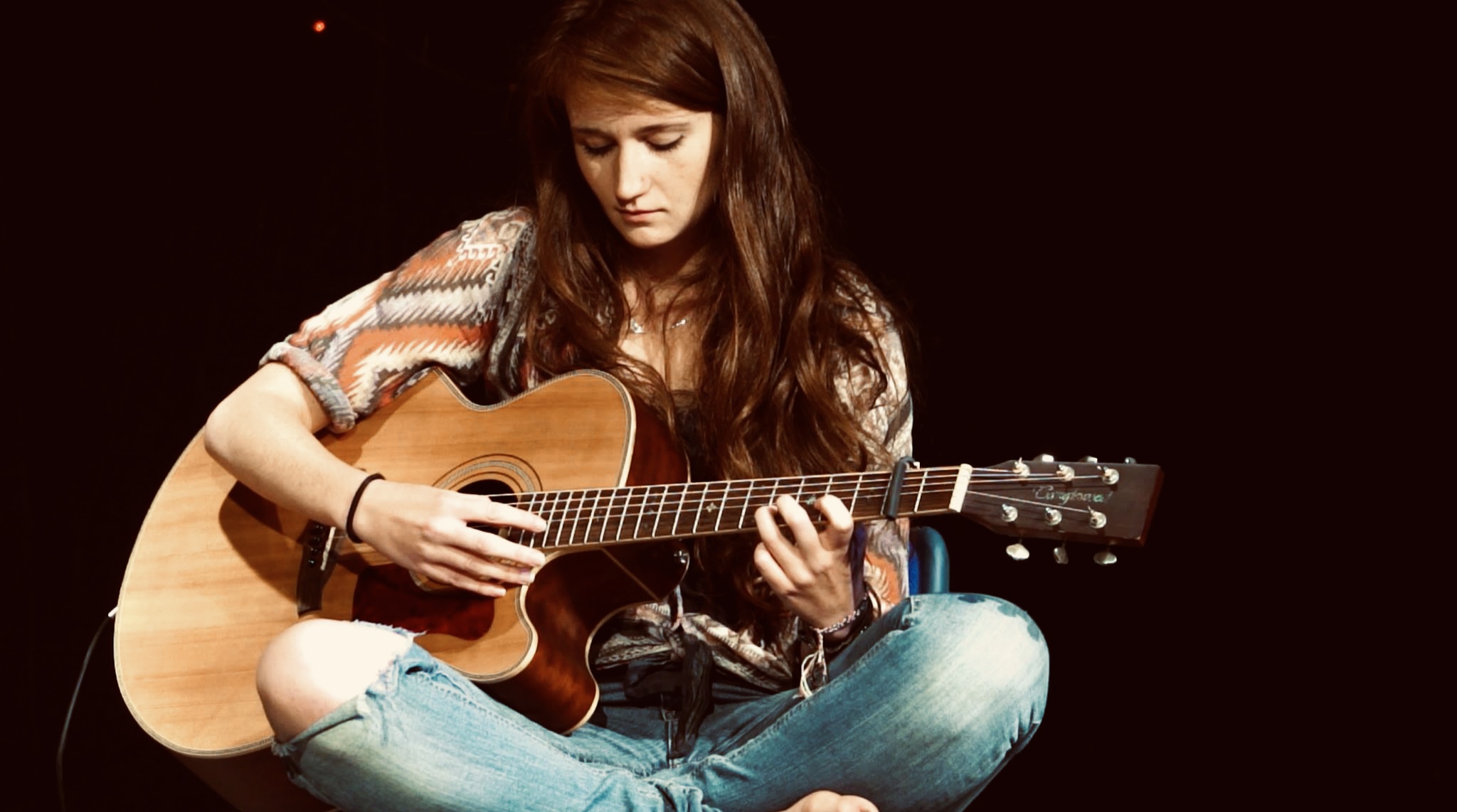Voyager guitarists Simone Dow and Scott Kay on being the first prog-metal band in the Eurovision Song Contest: "We love a little bit of cheese every now and then, so why not throw that in with a nice little mountaintop solo?"
The duo also explain why the key to a good guitar riff is the drums

Want all the hottest music and gear news, reviews, deals, features and more, direct to your inbox? Sign up here.
You are now subscribed
Your newsletter sign-up was successful
For more reasons than one, the glitzy stage of the Eurovision Song Contest isn’t necessarily where you'd expect to come across an Australian progressive metal band. But, come Saturday 13 May (assuming they make it through to the Grand Final), that’s exactly where you’ll find Voyager – the Perth based quintet whose genre-smashing feel-good romp, Promise, is guaranteed to cause spontaneous air guitar breakouts in living rooms from Reykjavik to Baku and beyond.
Synth-sational keytar wizardry comes courtesy of frontman Danny Estrin, while guitarists Simone Dow and Scott Kay work together to bring a battery of tag-team riffs and nifty fretboard workouts in an altogether fresh take on what can be achieved within the standard three-minute window that Eurovision entrants are afforded to showcase their skills.
“I think we suit the setting of Eurovision quite well, even though the music we play might not necessarily be “Eurovision music”,” suggests Scott, who – like Simone – wields a mean-looking seven-string at all times. “But, you know, it’s still got a bit of that ‘80s fun baked in there.”
It’s really hard to create something that makes a statement in three minutes
Scott Kay
Initially encouraged to enter by lots of fan interest and annually recurring surges in the use of the hashtag “#VoyagerForEurovision”, the long-established band has been trying their luck for selection ever since Australia was invited to take part in 2015. Making it this far is understandably a big deal.
“We’re just excited,” enthuses Simone. “If anything, this is a massive opportunity where we get to play to more people – both through the lens and also in the room – than we’ve ever played to before.”
But, alongside the heightened exposure and generally getting “sucked into the vortex,” as Scott puts it, striving towards the competition has had a surprisingly formative effect on the working practices of the band, whose naturally proggy tendencies now converge with an appreciation for the art of crafting concise poppy bangers.
“It’s really hard to create something that makes a statement in three minutes,” underscores Scott, who credits the Eurovision experience with having catalysed “a real level up” in the kind of songwriting we’ll see and hear from the band going forward.
Want all the hottest music and gear news, reviews, deals, features and more, direct to your inbox? Sign up here.
With the countdown ticking until the “big night,” box-fresh guitars all round especially for the occasion and the promise of a new studio album before the summer is out, we caught up with the Aussie riffers at what is no doubt the pinnacle of their careers to date…

How have you been preparing yourselves musically and mentally for performing to a predicted audience size of 160 million people at Eurovision?
Scott: "I guess in terms of music, we haven’t really played much at all! We’ve got a gig, which is now sold out, so we’re going to be able to blow off some steam there, and I think that’s actually really valuable for us because we’ve had three minutes to a maximum of six minutes on stage every time we’ve performed lately."
Simone: "It’s really unsatisfying, especially when the crowd is so into it! The Eurovision crowd sings every single word at you, and it’s mind-blowing. You can literally hear it over the in-ears."
"So yeah, to get that energy in the room and then have to go because it’s the next act’s turn, it’s like ‘Arrrgh!’
"But, in terms of prep, this line-up of the band has been together for 12 years, and the band as a whole has been around for about 20 years, so it’s nothing new for us to play to audiences and perform. We’re just very excited and want to get out there and perform for everyone!"
Tell us a little bit about Promise, the song you’ve entered into the contest…
Scott: "It’s interesting because we don’t play for half the song! But, that was very much a conscious choice when we were composing the tune. We wanted the opening to be mysterious, draw you in and let it build.
"We really composed this song with Eurovision in mind. As guitar players, both of us collectively felt that there was no point in injecting more guitar than was necessary, and I think that pays dividends because the minute the band kicks in, it’s like bam!
"The thing we’ve been hearing a lot with reactions now is that it’s a rock song, or that it’s a metal song. For new people who don’t know who Voyager are, they don’t know what to expect, so when you slam them with low G-tuned guitars, they’re like, 'Oh, damn!'"
Simone: "There’s a breakdown as well. We just wanted a few left turns for people."
As a band with a catalogue of diverse and sometimes quite lengthy songs, how did you go about penning a track for Eurovision where you’ve only got a short time to show people what you’re made of?
Simone: "First of all, it’s extremely hard to condense everything you want into three minutes. I think that’s something that we now really appreciate and we take our hat off to other artists that are doing pop songs because it is really not that easy to condense it down and get all the little points that you want to pop out, lift the song and tell a story.
"That was most important from the guitar side of things - having those impact moments. The main ones are when the song comes in and kicks with the whole band, then the breakdown, then the huge euphoric guitar solo section at the end where everything just feels glorious!"
There’s also a very satisfying segue from guitar solo to keytar solo…
Scott: "We do enjoy a good trade-off! That’s a classic ‘80s rock thing. We wanted to try and capture some of that fun cheesiness in the song.
"Eurovision’s always a little bit cheesy. We love a little bit of cheese every now and then, so why not throw that in with a nice little mountaintop solo?"
What does your songwriting process tend to be like when you’ve not got competition rules to worry about?
Scott: "It’s changed, and actually it has changed because of Eurovision. When we were writing Dreamer [the band’s Eurovision selection effort from 2022], we took the same approach. We would normally get into a room and jam as a live band. But, it just felt a little cumbersome.
"If someone is trying to explore an idea and Ash is smashing the drums or Danny is going 'Whoooaaaah', it’s a total nightmare and it’s not productive!
"So, when we worked on Dreamer, we went into my studio at home and just sat with every individual part and fleshed it out as a group – but in front of the computer – so we could chop and change things as we wanted to, listen back and analyse things on a deeper level. We could all hear each other’s parts more clearly than you can in a jam room, and I think that lent itself to a more concise songwriting method.
"The new record that’s coming out around July was all written in this setting. I think it’s benefited us in a big way. We all know each other’s parts extremely well. We know the songs extremely well. It feels like there’s a lot more attention to detail on the new album. So, I feel like this is a real level up in terms of our songwriting process, and I think we’re all really feeling that."
Simone: "Definitely. It forced us to really think about the song. When you’re younger, everyone wants to have their parts going on. We can all admit that everyone’s really enthusiastic about their own instrument and wants max levels of their own thing in there. We’re all guilty of it – even Danny.
"Over the years, we’ve had to start taking keys out if it doesn’t work and it’s just filling it up with noise. Now, we’re doing the same with the guitars. You have to think: 'Does it really need a guitar part here?'
"It’s really forced us to think about the song more and that’s the most important thing moving forward. It’s not about us, it’s about the whole package."
You seem to have very successfully bridged the gap between prog, metal and pop, making the style of guitar music you play all the more accessible. What would you say has been the secret to your success with that?
The guitars really act as a support for everything else that’s going on
Scott Kay
Scott: "I think we do quite often coin ourselves as “a gateway band”, and I think a lot of people would say the same about us. We’re a band where, if you’re not necessarily sold on heavy music, we might be the band that could convince you otherwise.
"Not all heavy music is death metal vocals and really ludicrously heavy riffs. It can really vary in colour and size. The guitars really act as a support for everything else that’s going on. Promise is a synth-driven song, not a guitar-driven song. The guitars are really there to add thickness and to add depth to what is already there.
Simone: "They slowly build. I remember that that’s what we wanted for that second chorus in particular. That’s where we really wanted the guitars to hit the accelerator a little bit. You can hear in that second chorus that it starts to feel a bit more energetic. The drums have opened up, and it’s just these little things that you do to keep pushing things forward."
The riffs where you get the gurn face, that’s when you know you’re hitting gold
Simone Dow
Even in a supporting role, the dual guitar dynamic between you two does seem to yield a lot of really heavy and interesting riffs. In your opinions, what are the key ingredients for a banging riff?
Simone: "That’s a hard question!"
Scott: "It’s a very nebulous question in that you could approach it in so many different ways."
Simone: "It depends on the style of the song, but I like a good riff that isn’t overly complicated and you can feel it. Those are the ones that grab me the most. The ones where you get the gurn face, that’s when you know you’re hitting gold.
"It doesn’t necessarily have to be the most complex thing. I think that’s something I've gotten away from over time. It used to be about how many notes you could fit in one guitar lick. Maybe that was the thrash influence on me! That Gothenburg Swedish sort of thing. You really don’t need that. You can have a riff that’s just one note if it hits right.
Scott: "It’s hard to say because sometimes the guitar riff is only okay until you get the drums underneath it.
"I love the idea that the drums and the guitars might interlock, or deliberately not interlock and fill each other’s spaces.
"When you’re writing the riff originally, and you don’t have drums underneath it, it can be a little hard to work out what to do with that. Hearing the drums lock in with the riff is a big thing for me. If I hear a killer riff, I want to hear the drums and the guitars interacting in a really cool way.
"Every time you hear a killer riff, in my opinion, it’s because the drums are actually doing something to emphasise all of the key moments in it."
Simone: "We’ve actually changed some guitar riffs around Ash’s drumming because maybe he’s done a kick placement somewhere different or a fill, and we’ll want to follow that fill or take space. Sometimes having space in a riff gives massive impact. But yeah, Ash has informed a lot of our guitar riffs, so the drums are super important."
Scott: "So yeah, the key to a good guitar riff is the drums!"

Simone, you’ve recently revealed that you’re going to be using one of the new Music Man/Tosin Abasi Kaizen guitars at Eurovision. What attracted you to that instrument and will you be adopting it as your main steed going forward?
Simone: "You know what, there’s a high possibility! I picked it, honestly, when I was thinking about guitars for Eurovision. We knew that we were going to try and get something exciting and this just popped out. It just got released. It came up on an ad. I saw it was a seven-string, and I don't usually go for guitars that look pointy and angular, but I actually kind of like the look of this one.
"I thought this would look really sick on a Eurovision stage because it is a bit out there and a bit bombastic looking. Then, I read through the specs and saw it had an alder body, an ebony fretboard, a roasted maple neck – it’s all the woods that I love. My JPX has an alder body as well and it’s one of my favourite tone woods, and I love an ebony fretboard, so spec-wise, it was sounding pretty good!
"I watched a few videos and thought it sounded pretty cool as well. So, I took the plunge, got in touch with Music Man and they were happy to oblige as soon as they heard there’d be 160 million people watching and five million just for the semis.
"The way that it contours into the body is so comfortable. It curves in the right way for your right arm for picking and the neck is a dream. I don’t usually like multiscales, but the multiscale on this one is quite easy to play because it’s got this infinity radius neck on it where it doesn’t matter where you’re standing, you can see where you are on the fretboard. It’s incredible.
I haven’t heard a pickup this dynamic before
Simone Dow
"The Steinberger tuners are something I’ve never had on a guitar before, but they look cool and they’re really quite accurate for tuning. I’ve actually fallen quite in love with it! It’s just fat and tight. These new pickups that Music Man have done are heat treated, and it seems like they’re actually going to start putting those in all their guitars now. If they’re going to be as good as the ones that are in that guitar, I think it’s a really good move for them because they’re so dynamic.
"I haven’t heard a pickup this dynamic before, where you don’t pick heavy and it’s really light and not overly distorted, but then when you dig right in it’s just tight and heavy and clear. It’s not an overly high gain sort of distortion on it. You can literally hear the note poking through it as well."

Scott, what’s your main weapon of choice right now?
Scott: "My main squeeze is a Mayones Duvell Elite 7, which is basically the best instrument I’ve played. It’s an absolute workhorse. I’ve thrashed that thing on tour for the last seven years now. It’s played a lot of shows and it still plays like it’s brand new. It has not aged in my mind at all.
"The attention to detail in the woodwork and the craftsmanship is like nothing I’ve played. I feel like a good comparison in terms of the shape is the Ibanez RG, which is a shape that I love, and they’ve basically just taken that shape and put it up to 11!
"The carve on it is beautiful. It’s got an ebony ‘board, a wenge-bubinga neck, and I believe it’s a mahogany body with a maple cap.
"We’re currently in talks with Mayones at the moment and I’m going to be playing a different Duvell for the Eurovision show.
"There’s a lot of stuff in the works at the moment. I’m currently in talks with them about getting a new custom instrument made, which I am super, super excited about. It’s a bucket list thing to be able to talk to a luthier directly and say, “These are the things that I want to be able to do.”
"More details will come about that a little bit later down the line, but I’m probably going to be borrowing a completely different instrument for Eurovision, which is going to be sick! They’ve got this really awesome custom finish on this guitar that they think will look really awesome on the stage, so I’ll be able to reveal a little bit more later."
What are the other items of gear you simply couldn't live without?
Scott: "We’re basically all using Helix stuff. We’re all running Helix Stomps - mostly just because of the convenience of them as a touring piece of equipment is unparalleled. It literally weighs 700 grams or something ridiculous like that. You can throw it in your backpack and Bob’s your uncle, it’s all good!
"It’s the fact that we can just go DI into the PA and it sounds absolutely killer every single night. You don’t have to deal with any hassle with tubes dying or anything like that. We both love a good tube amp, let’s be real. I do love plugging into my Marshall at home and letting rip. That thing sounds amazing."
It’s almost impossible these days to tour with amps and cabinets, unfortunately
Simone Dow
Simone: "And I love my Mesa. I’ve been endorsed with Mesa/Boogie for over 10 years, but it’s just not practical, and it’s almost impossible these days to tour with amps and cabinets, unfortunately. Even taking a small amp with you, you have to arrange cabinets everywhere.
"You’ve then got to get bigger trailers to carry it all, whereas with everything being in-ears, it’s literally just your pedalboard and whatever you’ve got on that, your in-ear system and your guitar. It’s so much simpler. It weighs less. You’re not getting excess baggage fees."
Scott: Coming from Australia, you get hosed on stuff like that so we’ve spent a lot of time minimising our rigs as a result. The good thing is, I don’t honestly feel like we’ve compromised on sound. Digital amp modelling is so good these days that, for the sake of touring, you’re losing maybe five percent.
Simone: We’re using a lot of digital plugins as well now when we’re recording our albums and they sound like real amps. It’s insane.
Scott: I think the new record is entirely in box, Neural DSP plugins. We used the Gojira plugins for pretty much everything and it sounds ridiculously good!

What else can you tell us about your forthcoming album, Fearless In Love, at this point in time?
Scott: "We are very, very excited about this album. I am so proud of this album. We always get excited about Voyager records but this one hits different."
Simone: "I think it has some of the best performances by all of us. It definitely still sounds like a Voyager record, but it’s a lot more mature."
Scott: "The way that it was produced was quite different, too. We didn’t go for robotic levels of tightness – not that we’ve ever really done that – but this is a lot more natural feeling. I think it makes the record feel that much better because it leans into its own atmosphere a little bit harder. So, as a result, the record – to me – feels really cinematic. It’s like the soundtrack to a film."
- Voyager perform in the Eurovision semi-finals in Liverpool on 11 May with the Grand Final on 13 May. Fearless In Love is due for release on Friday 14 July via Season of Mist Records. Preorder.
Ellie started dabbling with guitars around the age of seven, then started writing about them roughly two decades later. She has a particular fascination with alternate tunings, is forever hunting for the perfect slide for the smaller-handed guitarist, and derives a sadistic pleasure from bothering her drummer mates with a preference for “f**king wonky” time signatures.
As well as freelancing for MusicRadar, Total Guitar and GuitarWorld.com, she’s an events marketing pro and one of the Directors of a community-owned venue in Bath, UK.
